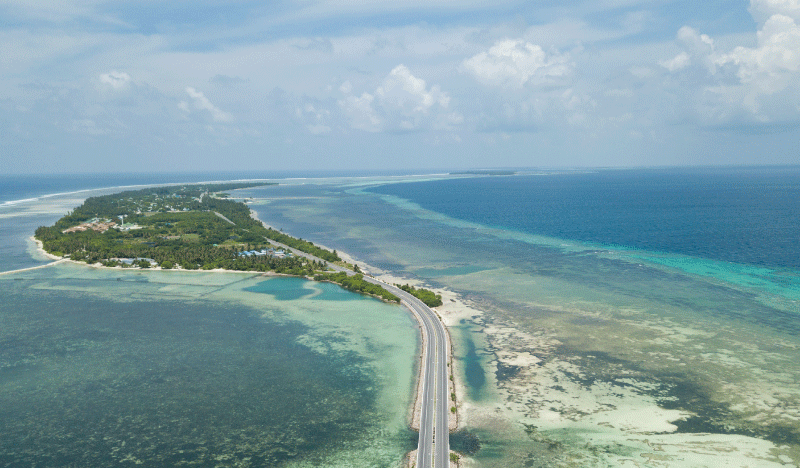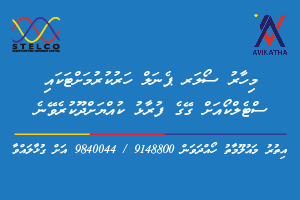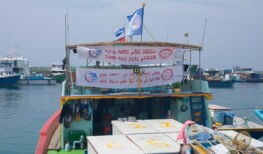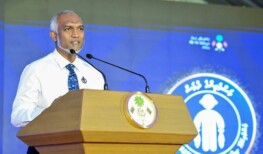COG Urges Muizzu to Reassess Development Initiatives Impacting Maldives’ Environment

Photo: MV+
The primary human rights challenge for the Maldives is the imminent threat to its nation and citizens due to the impacts of climate change. The Universal Declaration of Human Rights (UDHR) has inspired over seventy international human rights treaties and influenced the rights and freedoms outlined in the Maldivian Constitution 2008.
However, realising human rights and dignity remains an elusive aspiration in the Maldives. Efforts by consecutive governments to combat the existential threat posed by global heating and the impacts of climate change remain vastly inadequate. Concerningly, successive governments’ development policies have worsened the country’s climate resiliency.
Globally, scientists express shared concerns about the escalating trend of global heating, which is evident in 2023, being documented as the hottest year on record. The 2023 report from the United Nations Intergovernmental Panel on Climate Change (IPCC) presents a challenging outlook for the foundational coral reefs of the Maldives. The anticipated occurrence of a significant El Niño event adds to the risks faced by the Maldives’ coral reefs, which are essential to the nation’s survival.
The Maldives recognised its environmental vulnerability more than 35 years ago and continues to be a vocal advocate for climate action both regionally and globally — hosting the Thirteenth Session of the IPCC in 1997 and consistently advocating for accountability of big emitters and polluters at the annual Conference of the Parties (COP) of the United Nations Framework Convention on Climate Change (UNFCCC).
Valuing every grain of sand, island resilience a priority
Addressing COP28 dignitaries in the United Arab Emirates (UAE) in December 2023, President Mohamed Muizzu declared that:
“In our island nations, every coral, every grain of sand, every fish, and every palm tree carry value. Their loss is a loss to our economy and our country. Building the resilience of our islands is a priority.”
As civil society stakeholders, collectively represented by the Coalition for Open Governance (COG) and expressing concerns about the environmental condition of the Maldives, alignment is found with the President’s stance on the significance of valuing the environment. However, despite these international declarations, on the domestic front, successive governments, as acknowledged by COG, have persisted in causing irreversible harm to the nation’s environment, biodiversity, and wildlife habitats. These actions have the detrimental effect of compromising the climate resilience of the islands and communities, thereby exposing them to significant climate threats in both the short and long term.
On 18 November 2023, one day into President Muizzu’s administration, he announced that the government would initiate the reclamation of Fushi Dhiggaru lagoon in South Male’ atoll within 30 days. According to news reports, Muizzu’s administration will also initiate plans within its first 100 days to build commercial ports in Haa Alif Atoll and Laamu Atoll, with Laamu Gaadhoo identified as one location. These developments are extremely concerning, as Gaadhoo Island is one of the six marine protected areas of the atoll designated by the Maldives cabinet in December 2021.
Additionally, Laamu Atoll was declared a biodiversity ‘Hope Spot’ by the international non-governmental organisation Mission Blue in October 2021. Gaadhoo Island is a biodiversity reserve and the largest turtle nesting site in the country. The island is also well known for its rich terrestrial and marine ecosystems, including mangroves, seagrass meadows and feeding grounds for manta rays and other marine wildlife.
Land reclamation causes irreversible and permanent destruction to valuable ecosystems, with unknown and unaccounted losses to biodiversity and habitats. The country’s foundational reef systems and the multitude of natural ecosystems it sustains constitute the source of our economy, food security, wealth, well-being, natural defences and resilience to climate change. However, consecutive governments continue to engage in unchecked environmental destruction in the name of development, resulting in severe consequences, including ecological and fiscal debt and short-changing future generations.
COG calls on President Mohamed Muizzu to:
- Take urgent heed of the serious warnings of climate scientists and global earth systems research institutions regarding the unprecedented rise in global temperatures and the developing El Niño increasing heat stress on our ocean and vulnerable coral reef systems;
- Revoke the decision to reclaim Fushi Dhiggaru lagoon, which will cause widespread biodiversity losses, irreversible ecosystem degradation, loss and damage;
- Re-evaluate the planned infrastructure project in Laamu Gaadhoo, which will destroy the rich ecological assets with wide-ranging consequences and potential cascading effects on the Laamu Atoll Hope Spot and the validity of protected areas nationwide.
- Ensure environmental sustainability as a national priority in every development activity in line with Article 22 of the Constitution, and protect and conserve natural assets for the security and stability of present and future generations.
On this international Human Rights Day, there is no greater need for the people of Maldives than to protect and conserve our living environment, upon which all our lives, as well as the resilience of our islands and communities, depend.
To prioritise island resilience, valuing the natural environment is essential.









